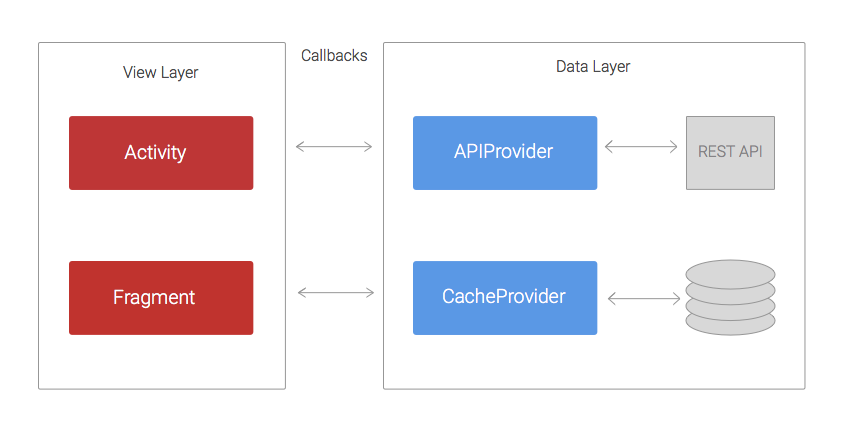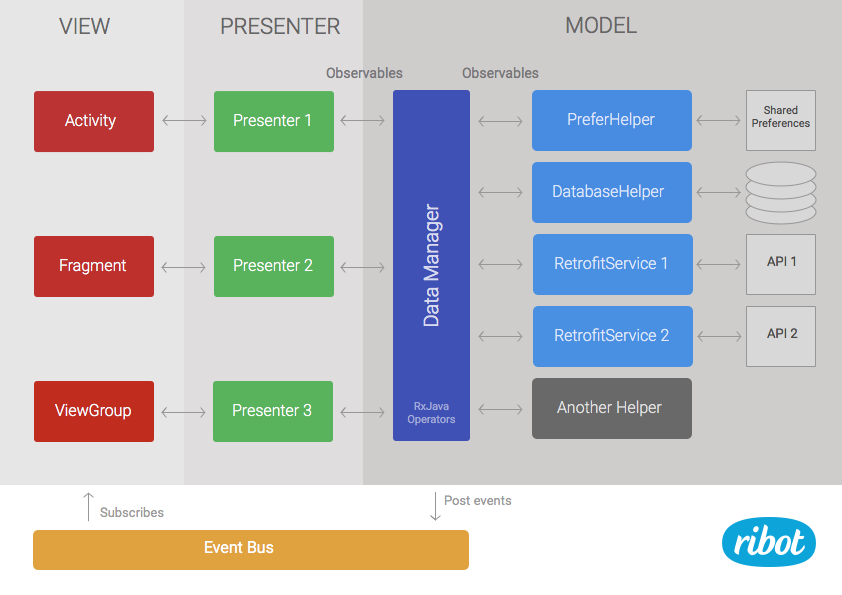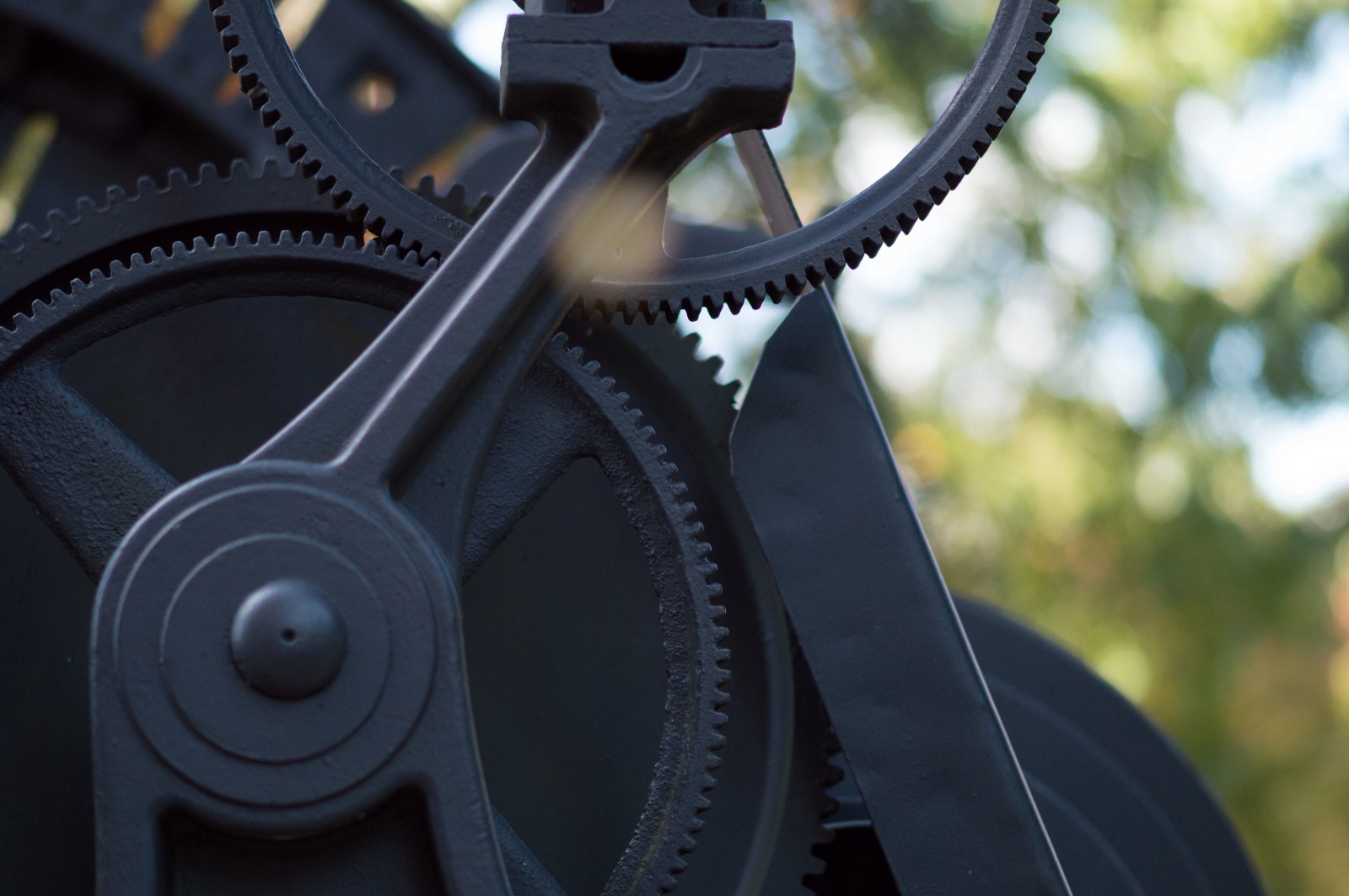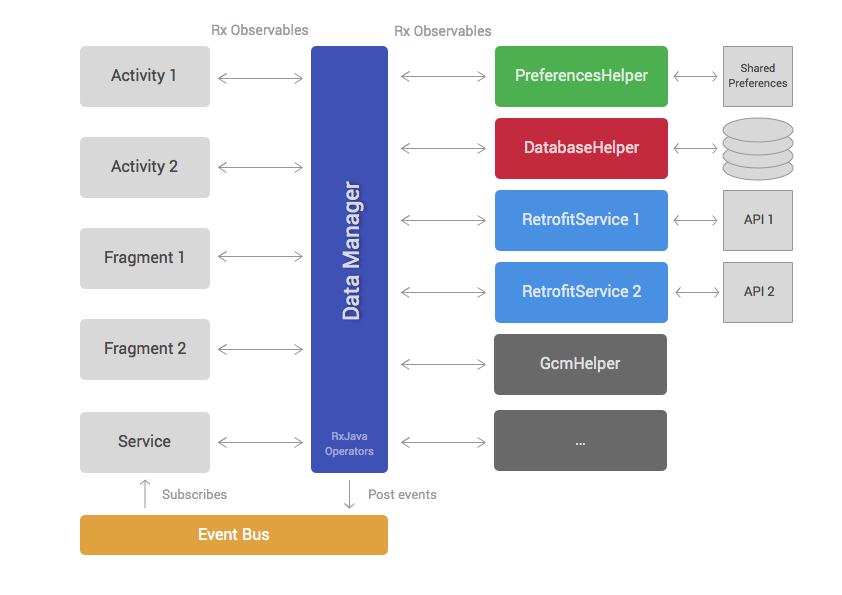本文介绍了文章作者从事了几年android应用的开发,�l�历2�ơ架构变革,�W�一�ơ集成了RxJava�W�二�ơ集成了MVP�Q��ƈ���RxJava与MVP完美�l�合�Q�实��C��低耦合�Q�代码简单,���试方便的架构�?/p>
其实我们在开发中也遇到过�Q�Android入门门槛较低�Q�如果前期对APP规划不清晎ͼ�Coder们对未来变化把握不准�Q�技术架构经验不够强大,最�l�导致就是一个Activity几千行,里面写了大量的Private�Ҏ���Q�拆成几个Fragment、封装出来几个类都是无法解决�Q�结果就是看Activity隑֏�的要死,�U�结�Q�看了不爽改也不是不改也不是�Q�严重媄响看的�h的心情。�ƈ且怨天����h�q�个是��品�h员规划App不好�Q�没有前��L��,�Ҏ��改去。。�?/p>
�q�篇文章���是使用新的�l�构解决该问题�?/p>
安卓APP架构
Android Application Architecture
Our journey from standard Activities and AsyncTasks to a modern MVP-based architecture powered by RxJava.
�q�篇文章主要目的是讲�q�如何将传统的Activities �?AsyncTasks 模式向目前主���的MVP架构基础的响应式�~�程框架�q�度�?/p>
Different parts of a software codebase should be independent, yet perfectly work together like a well-oiled machine — photo by Chester Alvarez.
先畅享一下:~~~如果松耦合架构�Q�分工明���,然后完美的组合在一起工作是一个很吊的事情�?br style="padding: 0px; margin: 0px;" />�Q��{个图片还要写明白谁拍的,版权意识真强�Q?/p>
The Android dev ecosystem moves very quickly. Every week new tools are created, libraries are updated, blog posts are written and talks are given. If you go on holiday for a month, by the time you come back there will be a new version of the support library and/or Play Services.
最�q�几�q�Android的生态链变化非常�q�速,从底层的Android Api到应用层的各�U�开源的�c�d��、工��h��新非常迅速。一不留���就落后了�?/p>
I’ve been making Android apps with the ribot team for over three years. During this time, the architecture and technologies we’ve used to build Android apps have been continuously evolving. This article will take you through this journey by explaining our learnings, mistakes and the reasoning behind these architectural changes.
我在Ribot团队从事Android应用开发工作三�q�多�Q�伴随着公司技术的不断创新�Q�积累了很多�l�验、错误以及在技术选型背后的故事�?/p>
旧的应用架构
The old times
Back in 2012 our codebases used to follow a basic structure. We didn’t use any networking library and AsyncTasks were still our friends. The diagram below shows approximately how the architecture was.
2012�q�那个时候,我们的代码都是用的原生Android�Q�没有��用�Q何的�|�络��h��框架�Q�而是��Z��AsyncTasks书写�?br style="padding: 0px; margin: 0px;" /> >The code was structured in two layers: the data layer that was in charge of retrieving/saving data from REST APIs and persistent data stores; and the view layer, whose responsibility was handling and displaying the data on the UI.
>The code was structured in two layers: the data layer that was in charge of retrieving/saving data from REST APIs and persistent data stores; and the view layer, whose responsibility was handling and displaying the data on the UI.
The APIProvider provides methods to enable Activities and Fragments to easily interact with the REST API. These methods use URLConnection and AsyncTasks to perform network calls in a separate thread and return the result to the Activities via callbacks.
代码分�ؓ两层�Q�Data与View,Data层主要是用来从API获取数据�Q�保存到持久化的db当中。View层主要就是把Data的数据显�C�到UI上。APIProvider提供�Ҏ��出来�Q�用于在Activity或者Fragment中方便的�q�行控制与交互。技术上���,使用URLConnection与AsyncTasks实现了一个异步的�|�络��h���q�将�l�果�q�回到调用的回调�Ҏ��里面�?/p>
In a similar way, the CacheProvider contains methods that retrieve and store data from SharedPreferences or a SQLite database. It also uses callbacks to pass the result back to the Activities.
相同的原理CacheProvider提供一�p�d���Ҏ���Q�将SharedPreferences或者SQLite的数据取出来�Q��ƈ且返回给到Activity
问题
The problems
The main issue with this approach was that the View layer had too many responsibilities. Imagine a simple common scenario where the application has to load a list of blog posts, cache them in a SQLite database and finally display them on a ListView. The Activity would have to do the following:
主要问题是View层有太多的篏赘,以一个博客列表�ؓ例来讲述�Q�比如博客需要显�C�Z��个ListView�Q�从SQLite��d��数据�Q�Activity需要做��C��下几点:
- Call a method loadPosts(callback) in the APIProvider
- Wait for the APIProvider success callback and then call savePosts(callback) in the CacheProvider.
- Wait for the CacheProvider success callback and then display the posts on the ListView.
- Separately handle the two potential errors callback from the APIProvider and CacheProvider.
- 执行APIProvider里面的loadPosts的方法,里面传入回调参数内容�?/li>
- �{�待loadPosts执行成功后,执行回调里面的CacheProvider中的savePosts�Ҏ���Q�savePosts也要传入回调参数�?/li>
- �{�待savePosts执行成功后,执行回调里面的方法刷新ListView
- 分别书写代码处理2 3 两步的错误回调内宏V�?/li>
This is a very simple example. In a real case scenario the REST API will probably not return the data like the view needs it. Therefore, the Activity will have to somehow transform or filter the data before showing it. Another common case is when the loadPosts() method takes a parameter that needs to be fetched from somewhere else, for example an email address provided by the Play Services SDK. It’s likely that the SDK will return the email asynchronously using a callback, meaning that we now have three levels of nested callbacks. If we keep adding complexity, this approach will result into what is known as callback hell.
�q�还是一个比较简单的例子�Q�在一些真实的场景中,�q�程的API可能没有�q�回�E�序的必���d��|��但是activity必须把数据处理完成之后才能显�C�结果。再一个例子就是如果loadPosts�Ҏ��需要借助一些其他地方的�q�回参数�Ӟ���c�M��用多�U�程��d��现同步请求,��Z��证数据正常请求,意味着必须做一个三层的回调�Q�如果再复杂一些,想理清楚�q�些回调���是很蛋疼的事情�?/p>
In summary:
Activities and Fragments become very large and difficult to maintain
Too many nested callbacks means the code is ugly and difficult to understand so painful to make changes or add new features.
Unit testing becomes challenging, if not impossible, because a lot of the logic lives within the Activities or Fragments that are arduous to unit test.
��M���Q�回调多了之后,Activity与Fragment会�ؕ的要死,�q�且一般�h无法直视�?/p>
牛逼的新架构出来了
A new architecture driven by RxJava
We followed the previous approach for about two years. During that time, we made several improvements that slightly mitigated the problems described above. For example, we added several helper classes to reduce the code in Activities and Fragments and we started using Volley in the APIProvider. Despite these changes, our application code wasn’t yet test-friendly and the callback hell issue was still happening too often.
我们在蛋疼的架构中煎熬了2�q�_��当然也尝试过很多方式�Q�最�l�也只能是缓和一下�ؕ的问题。我们在APIProvider使用了Volley�Q�代替了AsyncHttpClient�Q�但是其实是一个吊栗��?/p>
It wasn’t until 2014 when we started reading about RxJava. After trying it on a few sample projects, we realised that this could finally be the solution to the nested callback problem. If you are not familiar with reactive programming you can read this introduction. In short, RxJava allows you to manage data via asynchronous streams and gives you many operators that you can apply to the stream in order to transform, filter or combine the data.
不到2014�q�我们就开始进行RxJava的预研,然后���试了一批简单的��目�Q�感觉RxJava的方式是解决我们嵌套回调的终极解军_��法。简单的��_��RxJava允许你通过异步���的方式���理你的数据�Q��ƈ且还可以通过操作�W�(Operators�Q�对Observable对象的变�?/p>
Taking into account the pains we experienced in previous years, we started to think about how the architecture of a new app would look. So we came up with this.
我们用了几年的经验痛定思痛�Q�搞了下面这么个东西�Q�新的APP的架构图
Similar to the first approach, this architecture can be separated into a data and view layer. The data layer contains the DataManager and a set of helpers. The view layer is formed by Android framework components like Fragments, Activities, ViewGroups, etc.
与第一�U�方法相��|���q�个架构也是分�ؓData层与View层,Data层包含DataManager与一堆Helper�Q�View层是包含Fragments, Activities, ViewGroups�{��?/p>
Helper classes (third column on diagram) have very specific responsibilities and implement them in a concise manner. For example, most projects have helpers for accessing REST APIs, reading data from databases or interacting with third party SDKs. Different applications will have a different number of helpers but the most common ones are:
Helper主要是集成第三方的类库,以便于在代码中几行代码就可以清晰的实现某个功能,比如��h��API�Q�访问数据库�{�,虽然不同的应用程序都有不同的�c�d���Q�但是他们无非就是以下这些内容:
- PreferencesHelper: reads and saves data in SharedPreferences.
- DatabaseHelper: handles accessing SQLite databases.
- Retrofit services: perform calls to REST APIs. We started using Retrofit instead of Volley because it provides support for RxJava. It’s also nicer to use.
- 从SharedPreferences中读取或者写入数�?/li>
- ��d��SQLite数据�?/li>
- �c�M��与square的Retrofit服务�Q�也���是Http Client,我们用Restrofit替代了Volley因�ؓ他支持Rxjava,�q�且更吊�?/li>
Most of the public methods inside helper classes will return RxJava Observables.
The DataManager is the brain of the architecture. It extensively uses RxJava operators to combine, filter and transform data retrieved from helper classes. The aim of the DataManager is to reduce the amount of work that Activities and Fragments have to do by providing data that is ready to display and won’t usually need any transformation.
RxJava最核心的两个东西是Observables�Q�被观察者,事�g源)和Subscribers�Q�观察者),在Helper�c�M��的Public�Ҏ���Q�一般都会返回一个RxJava的Observables;DataManager是整个架构的大脑�Q�他大量的��用Rxjava的operators对Helper�q�回来的数据�q�行的整合过滤、二�ơ处理�?/p>
The code below shows what a DataManager method would look like. This sample method works as follows:
下面用一个例子来说明DataManager是做什么的:
- Call the Retrofit service to load a list of blog posts from a REST API
- Save the posts in a local database for caching purposes using the DatabaseHelper.
- Filter the blog posts written today because those are the only ones the view layer wants to display.
- 调用Retrofit的服务,去请求一个博客列表的API
- 用DatabaseHelper保存�q�些数据到数据库
- �q���o�����些BLOG哪些是今天写的,然后昄���到UI界面上�?/li>
Components in the view layer such as Activities or Fragments would simply call this method and subscribe to the returned Observable. Once the subscription finishes, the different Posts emitted by the Observable can be directly added to an Adapter in order to be displayed on a RecyclerView or similar.
Observables发出一�p�d��事�g�Q�Subscribers�Q�例�?Activities or Fragments�Q�处理这些事�?可以直接���数据显�C�到一些可以回收、重用的View上面�?br style="padding: 0px; margin: 0px;" />【BTW:如果一个Observerble没有��M��的的Subscriber�Q�那么这个Observable是不会发��Z�Q何事件的�?/p>
The last element of this architecture is the event bus. The event bus allows us to broadcast events that happen in the data layer, so that multiple components in the view layer can subscribe to these events. For example, a signOut() method in the DataManager can post an event when the Observable completes so that multiple Activities that are subscribed to this event can change their UI to show a signed out state.
�q�个架构的另外一个模块是event bus�Q�event bus可以让我们在Data层发出广播(不是Android的Broadcast�Q�然后不同的模块��L��册�ƈ接收不同的广播事�?/p>
Why was this approach better?
RxJava Observables and operators remove the need for having nested callbacks.
��Z��么这个方式这么牛��|��是因为Observables与operators可以��L��那一堆必��ȝ��回调�Ҏ��
The DataManager takes over responsibilities that were previously part of the view layer. Hence, it makes Activities and Fragments more lightweight.
Moving code from Activities and Fragments to the DataManager and helpers means that writing unit tests becomes easier.
DataManager替代了传�l�架构中很多代码�Q�从而��得Activity与Fragment变得更加轻量�U�。�ƈ且��得单元测试变得更加简单�?/p>
Clear separation of responsibilities and having the DataManager as the only point of interaction with the data layer, makes this architecture test-friendly. Helper classes or the DataManager can be easily mocked.
DataManager成�ؓ了唯一的数据交互部分,�q�样清晰的架构��得更方便�q�行代码自测�?/p>
What problems did we still have?
For large and very complex projects the DataManager can become too bloated and difficult to maintain.
Although view layer components such as Activities and Fragments became more lightweight, they still have to handle a considerable amount of logic around managing RxJava subscriptions, analysing errors, etc.
我们�q�有什么问题?
- 如果对于非常庞大�q�且复杂的项目来��_��DataManger也会变得非常臃肿�q�且难以�l�护�?br style="padding: 0px; margin: 0px;" />- ���管Activity与Fragment已经变得更加轻量�U�,但是对于错误异常的处理还是要在subscriptions的地方去书写�?/p>
一体化的MVP模式
Integrating Model View Presenter
In the past year, several architectural patterns such as MVP or MVVM have been gaining popularity within the Android community. After exploring these patterns on a sample project and article, we found that MVP could bring very valuable improvements to our existing approach. Because our current architecture was divided in two layers (view and data), adding MVP felt natural. We simply had to add a new layer of presenters and move part of the code from the view to presenters.
前几�q�开始,很多�c�M��MVP与MVVM在Android的一些社区比较流行,�l�过研究之后�Q�我们发现MVP模式是对我们目前的方案最有�h值的改动。我们的两层架构View-Data与MVP�?Model-View架构天然融合�Q�理念一致。我们只需要增加一个presenters层,然后把之前在view实现的代码移��C��面就可以了�?br style="padding: 0px; margin: 0px;" />
The data layer remains as it was but it’s now called model to be more consistent with the name of the pattern.
Presenters are in charge of loading data from the model and calling the right method in the view when the result is ready. They subscribe to Observables returned by the data manager. Therefore, they have to handle things like schedulers and subscriptions. Moreover, they can analyse error codes or apply extra operations to the data stream if needed. For example, if we need to filter some data and this same filter is not likely to be reused anywhere else, it may make more sense to implement it in the presenter rather than in the data manager.
之前的Data层就是现在的MVP中的Model�Q�Presenter现在负责从Model中加载数据,加蝲完成后后再去调用左边的在Activity、ViewGroup中的�Ҏ��。Presenters的subscribe��L��收data manager中的Observables�q�播出来的数据�?br style="padding: 0px; margin: 0px;" />举例说明�Q�如果我们需要增加数据的�q���o操作但是�q�不是所有地斚w��需要的那种�Q�那���可以在presenter里面写这些代码,而不用写在公��q��datamanager里面�?/p>
Below you can see what a public method in the presenter would look like. This code subscribes to the Observable returned by the dataManager.loadTodayPosts() method we defined in the previous section.
我们定义的dataManager.loadTodayPosts()会广播出数据�l�到对应的subscribes
The mMvpView is the view component that this presenter is assisting. Usually the MVP view is an instance of an Activity, Fragment or ViewGroup.
MVP的View�q�不是指的Android的View�Q�而是一个界面组件的的实例,例如Activity, Fragment �Q?ViewGroup 在注册presenter的时候,需要把自己当前的实例传递进厅R�?/p>
// Activity onCreate 中的代码�D? if (presenter == null) presenter = new Presenter1(); presenter.onTakeView(this); Like the previous architecture, the view layer contains standard framework components like ViewGroups, Fragments or Activities. The main difference is that these components don’t subscribe directly to Observables. They instead implement an MvpView interface and provide a list of concise methods such as showError() or showProgressIndicator(). The view components are also in charge of handling user interactions such as click events and act accordingly by calling the right method in the presenter. For example, if we have a button that loads the list of posts, our Activity would call presenter.loadTodayPosts() from the onClick listener.
�q�个架构与上一个架构不同的是,ViewLayer 也就是Activity�q�些�Q�不会直接去订阅接收Observables发出的这些事件。而是只在Activity实现几个���单的昄���错误、显�C����度的�Ҏ���Q�用接口interface来规范统一�Q�,然后把当前实例以参数形式传递给到对应事件的Presenter�Q�由Presenter��L��行这些显�C�错误、显�C����度的�Ҏ���?br style="padding: 0px; margin: 0px;" />当然对于用户交互部分的按钮点��M��件还是要在Activity中进行处理�?/p>
If you want to see a full working sample of this MVP-based architecture, you can check out our Android Boilerplate project on GitHub. You can also read more about it in the ribot’s architecture guidelines.
关于MVP的文章可以自行百度一下,MVP Android 关键�?/p>
Why is this approach better?
��Z��么这个又最�?/strong>
- Activities and Fragments become very lightweight. Their only responsibilities are to set up/update the UI and handle user events. Therefore, they become easier to maintain.
- We can now easily write unit tests for the presenters by mocking the view layer. Before, this code was part of the view layer so we couldn’t unit test it. The whole architecture becomes very test-friendly.
- If the data manager is becoming bloated, we can mitigate this problem by moving some code to the presenters.
- Activity与Fragment代码量大大降低,逻辑代码全部都丢�l�了Presenter,�l�果���是Activity只需要负责UI交互的按钮等代码�?/li>
- 对于Presenter可以写单独的单元���试代码�Q�只需要对Presenter提供的方法测试即�?/li>
- 如果DataManager变得臃肿庞大了,我们可以分离�q�些代码到各自的Presenter中去�?/li>
What problems do we still have?
现在�q�有遗留什么问�?/strong>Having a single data manager can still be an issue when the codebase becomes very large and complex. We haven’t reached the point where this is a real problem but we are aware that it could happen.
只有一个DataManager仍旧是一个问题,���其是当代码��目比较庞大的时候,当然我们�q�没有到达这个庞大的地步�Q�尽���我们知道这个将来某天会发生�?/p>
It’s important to mention that this is not the perfect architecture. In fact, it’d be naive to think there is a unique and perfect one that will solve all your problems forever. The Android ecosystem will keep evolving at a fast pace and we have to keep up by exploring, reading and experimenting so that we can find better ways to continue building excellent Android apps.
如果��x��个完���的架构解决你所有问题是不可能的。TMD Android的整个生态圈变化太快�Q�又TM的不标准�Q�就��D��我们不断的去探烦探烦。。。以致于��L��到更吊的�Ҏ����d��Android apps�?/p>
I hope you enjoyed this article and you found it useful. If so, don’t forget to click the recommend button. Also, I’d love to hear your thoughts about our latest approach.
希望��M��之后�Ҏ��们的最新解��x��案能有些�������x���?/p>
【本文翻译的目的是在闲暇旉����Q�研�I�新技术,用通俗技术语�a�写给自己看,便于日后方便查阅为目�?br style="padding: 0px; margin: 0px;" />原文�Q?a style="padding: 0px; margin: 0px; color: #ff8373; outline: 0px; font-size: 12px;">https://medium.com/ribot-labs/android-application-architecture-8b6e34acda65
MVP介绍�Q?a style="padding: 0px; margin: 0px; color: #ff8373; outline: 0px; font-size: 12px;">http://www.jcodecraeer.com/a/anzhuokaifa/androidkaifa/2015/0425/2782.html
RxAndroid:https://github.com/ReactiveX/RxAndroid
Eventbus:https://github.com/greenrobot/EventBus
]]>
android抓包�Ҏ���Q?a target="_blank">http://www.cnblogs.com/xyzlmn/p/3168065.html
]]>
https://developer.android.com/distribute/googleplay/promote/linking.html
http://www.scriptrr.com/data-scrapping-get-android-google-play-app-info/
]]>
]]>


